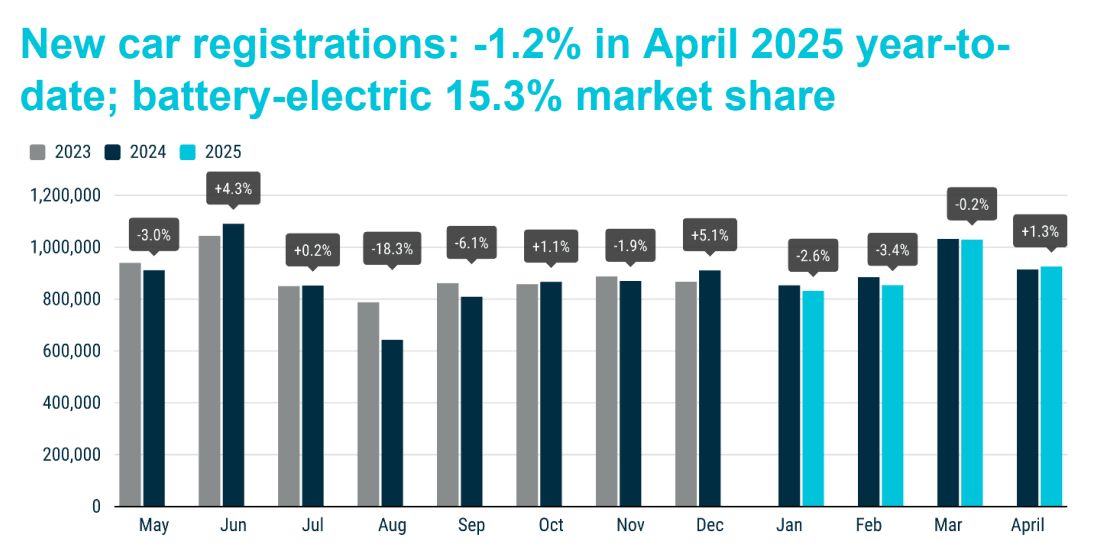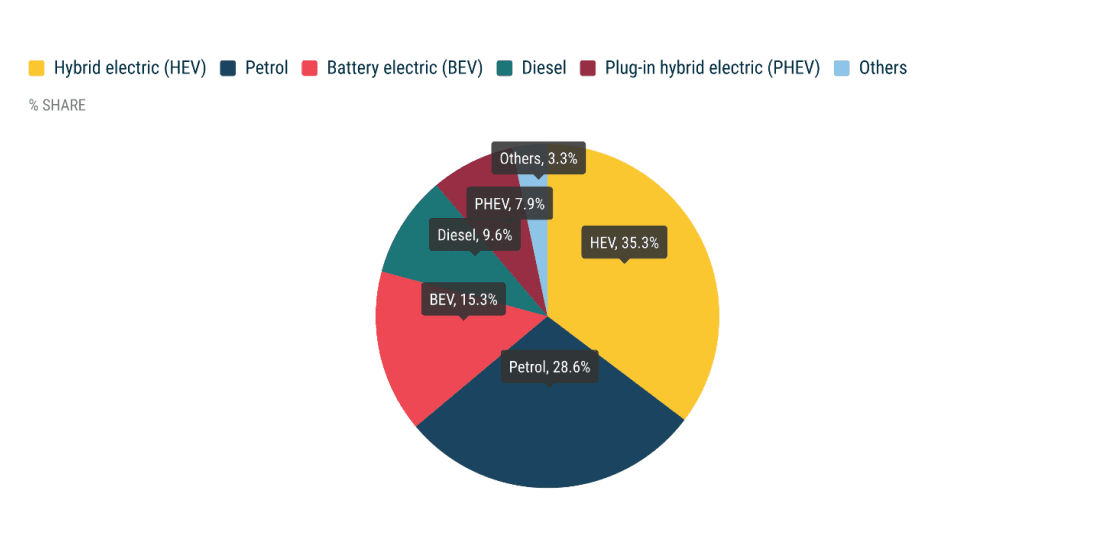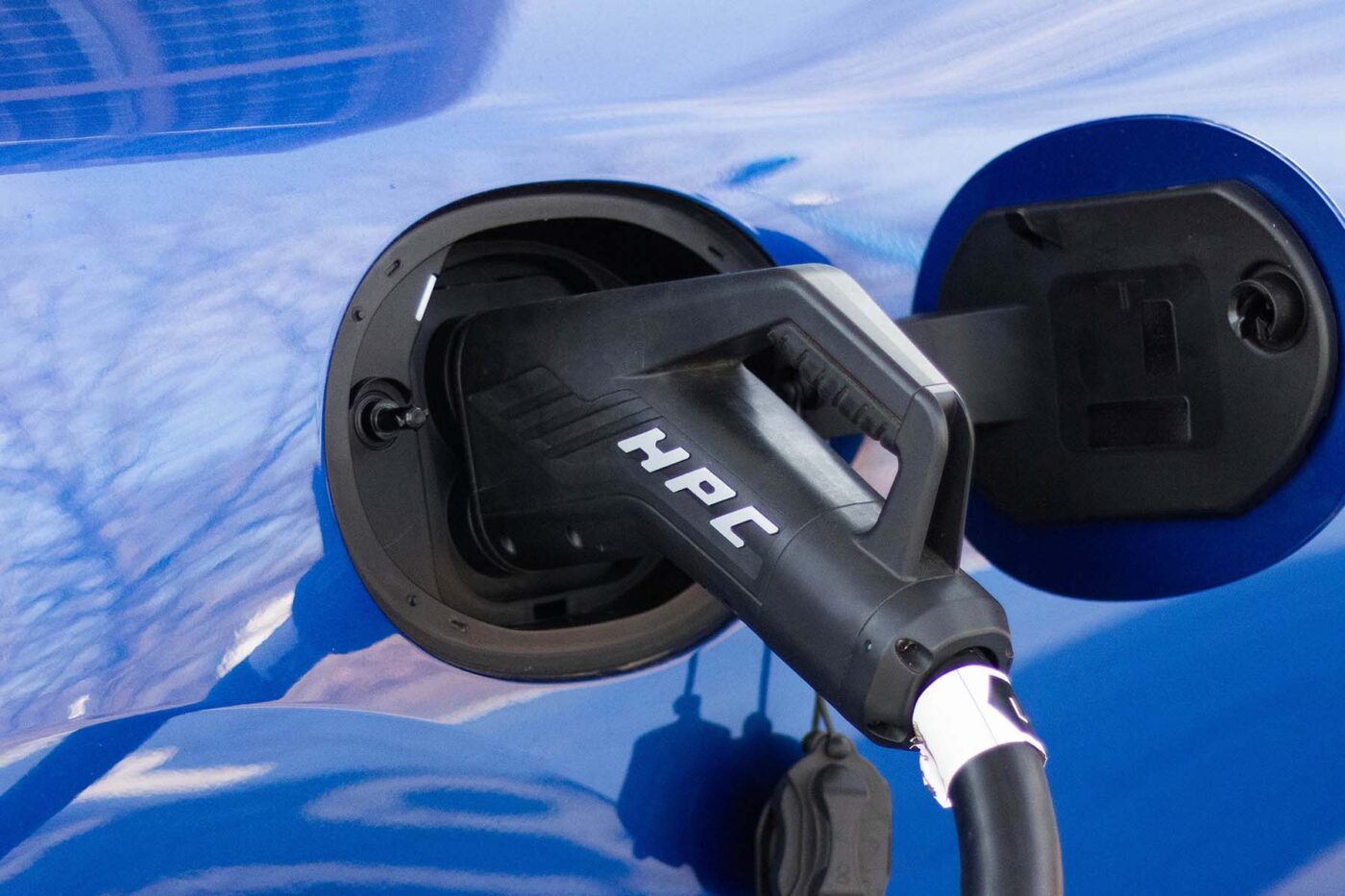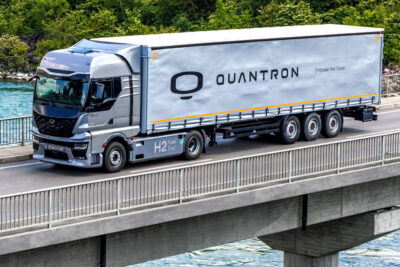Electric cars overtake diesel in new EU vehicle registrations
In April, registrations of electric cars in the EU continued to develop positively and increased by a third (34.1%) – this is reflected in a strong four-month balance for 2025 to date: after the electric share across the EU was already at 15.2 per cent in the first quarter, it has now grown to 15.3 per cent between January and April thanks to 558,262 new units. To compare: a year earlier, market penetration was still at twelve per cent.
At the same time, the overall market grew by 1.3 per cent in April, according to the ACEA’s latest statistics. In March, new registrations across the EU had fallen by 0.2 per cent, in January and February by as much as -2.6 and -3.4 per cent respectively. The ACEA sees this “as a sign of recovery despite the still unpredictable global economic environment.”
Electric cars played a major role in this recovery: three of the four largest markets in the EU, which account for 63 per cent of all battery electric vehicle registrations, recorded robust growth in April: Germany (+42.8 per cent), Belgium (+31.3 per cent) and the Netherlands (+6.4 per cent). This contrasted with a decline of 4.4% in France. This quartet of countries already showed a similar picture in March. The decline in France could have something to do with the fact that a particularly large number of BEVs were put on the road a year ago via the ‘social leasing’ subsidy programme of the French government.


It is also interesting to look at the UK. There, 144,749 new BEVs have been registered since the beginning of the year, an increase of 35 per cent. Germany remains ahead in terms of absolute figures with 158,503 newly registered BEVs to date. This is significant because the UK overtook Germany in terms of BEV registrations for the first time in 2024. After the first four months of the current year, Germany is now back in the lead. Incidentally, France is the only other European country to also have a six-digit BEV registration figure, so far this year (100,061 units).
Despite Model Y Juniper: Tesla continues to plummet
In terms of new registrations by manufacturer, the ACEA does not differentiate between drive types, so only statements on pure BEV manufacturers are possible here. Between January and April, 41,677 new registrations were registered for Tesla in the EU, which corresponds to a fall of 46 per cent compared to the same period last year. In April, the decline was 53 per cent to 5,475 new registrations. This means that the deliveries of the revised Model Y Juniper, which have now begun, have not brought about a trend reversal. However, if the EU figures are supplemented by registrations in the UK and EFTA countries (Iceland, Norway, Switzerland and Liechtenstein), Tesla has seen a slightly muted fall of 39 per cent since the beginning of the year.
Another e-manufacturer worth mentioning is Smart. Here, the decline after the first four months of the year is also striking at 67.6 per cent. In April, as many as 73 per cent fewer new Smarts were registered in the EU, with only 644 vehicles instead of 2,397 new Smarts in April 2024.
Among the other drive types, electrified drive systems were also up in the year to date: plug-in hybrids increased by 7.8 per cent to 287,850 vehicles, with Germany (+46.6%), Italy (+41.8%) and Spain (+42.8%) being the main drivers here. As a result, the EU-wide market share of part-time electric vehicles climbed slightly to 7.9 per cent (from 7.6 per cent in Q1). Hybrid electric vehicles were the most popular drive type, with registration figures up by 20.8 per cent. With a market share of 35.3%, hybrids are now well ahead of petrol-only vehicles (28.6%).
The combined market share of petrol and diesel combustion engines has fallen from 48.4 to 38.2 per cent within a year. While new diesel registrations in the EU were still ahead of electric cars in the first four months of the previous year (472,589 diesels to 441,785 BEVs), electric cars have clearly taken the lead since the beginning of the yea,r with 558,262 new registrations. Only 348,050 new diesel cars were registered.
Country ranking in April
In April, ACEA recorded 145,341 new electric cars in its analysis, an increase of 34.1 per cent – although growth was lower in March at 17.1 per cent, the absolute number of units was higher (157,505 BEVs). The fact that the 2025 figures are constant and significantly higher than 2024 is, of course, due to the fact that new registrations in the important electric car market of Germany, for example, fell at the beginning of 2024 following the abrupt end of the environmental bonus.
In April, Germany was once again the largest e-car market in the EU with 45,535 new registrations (+53.5 per cent), although this had already been known from the KBA figures since the beginning of April. France (25,542 BEVs, +2.8 per cent), Belgium (12,469 BEVs, +35.8 per cent) and Denmark (9,567 BEVs, +45.5 per cent) followed just ahead of the Netherlands (9,235 BEVs, +1.8 per cent). The Czech Republic (1,229 BEVs, +110.8%) and Italy (6,643 BEVs, +108.2%) recorded the highest growth. As in March, the sharpest decline was recorded in Romania with -70.1 per cent from 728 to 218 new e-cars.
Outside the European Union, two European countries recorded five-digit registration figures in April: Great Britain (24,558 BEVs, +8.1 per cent) and Norway (10,942, +8.9 per cent).
acea.auto (PDF)





0 Comments